EFFECTIVE SNORING EXERCISES FOR A GOOD NIGHT’S SLEEP Written By: Dr. Ankita Shah, 6 March 2023

Snoring, a common sleep disorder, is characterised by the loud noises a person makes while they sleep due to the vibrations of the soft tissues in their throat while breathing. Snoring has been known to disrupt sleep quality and cause interruptions in breathing. Snoring has also been associated with daytime fatigue and numerous other health problems.
It stresses the need to find a solution to snoring, as it can improve sleep quality and reduce the risk of serious health conditions such as high blood pressure, heart disease, and stroke. It can also ensure that your snoring doesn’t interrupt the sleep of the person sharing the room with you.
Snoring exercises are a natural solution to alleviate snoring. How do they work? Snoring exercises can help strengthen throat and mouth muscles reducing the likelihood of your soft tissues vibrating when you are sleeping. These exercises can help people who experience moderate snoring.
To better understand how snoring exercises can help, let’s first examine the common causes of snoring before delving into some exercises that can be tried at home.
A] Causes Of Snoring:
Snoring can be caused due to various factors, let’s take a look at some of the most common factors that may lead to snoring:
Nasal congestion or allergies: Allergies or nasal congestion can lead to inflammation and narrowing of the nasal passages, which restrict the airflow through the nose, making you more susceptible to snoring.
Obesity or excess body weight: Excess weight often comes with accumulations of excess fat tissue in the neck and throat, which can put pressure on the airways, narrowing them and restricting airflow, making you more prone to snoring.
Enlarged tonsils or adenoids: When your tonsils or adenoids are enlarged, they can block the airflow in the throat, causing snoring.
Alcohol consumption: Alcohol is considered a muscle relaxant. It relaxes your throat muscles causing airway obstruction and snoring.
Smoking: Smoking can irritate your throat and may also inflame your throat tissues. This can increase the swelling in your throat, creating airway obstruction that ultimately leads to snoring.
Sleeping on one’s back: When you are sleeping on your back, gravity can cause the tongue and throat tissues to relax, narrowing the airway and restricting the airflow. This can cause snoring.
Age-related changes in the throat: Ageing can diminish the muscles in your throat, making them weaker and increasing the tendency for the soft tissues to relax. Relaxed throat tissues can obstruct the airway when you are sleeping and cause snoring.
Narrow Jaw Structure: A narrow jaw can reduce tongue space, causing the tongue to fall back and obstruct the airway during sleep. This can lead to snoring and other sleep-related breathing problems.
Tongue Tie: In people with Tongue Tie, the band of tissue connecting the tongue to the bottom is shorter. This tissue is known as lingual frenum and can restrict the movement of your tongue, causing it to fall backwards when you are sleeping, leading to snoring.
Deviated Nasal Septum (DNS): A septum is the all of cartilage and bone that separates the two sides of your nasal cavity. A deviated septum is a condition in which the wall is not centred but deviated to one side.When a person with DNS, breathes in, it causes vibration of the soft tissues resulting in snoring.
Enlarged Turbinates: Nasal turbinates are bony structures inside the nasal cavity that humidifies and filters the air that we breathe in. When these turbinates are enlarged or inflamed, it can cause nasal congestion and difficulty in nasal breathing, leading to snoring.
Nasal Polyp: Nasal Polyps are non-cancerous soft and painless growth in the lining of the nasal passages or sinuses. These can make it difficult for a person to breathe through their nose, making it necessary for them to resort to mouth breathing when they are asleep. This contributes to snoring.
These causes stress the importance of making conscious lifestyle changes such as maintaining a healthy weight, quitting smoking, and avoiding alcohol before bedtime. Incorporating these changes that can help reduce snoring. You can incorporate exercises for snoring as a part of this routine since it is an effective way to alleviate snoring and improve overall sleep quality.
B]Effective Exerciheight-100ses To Reduce Snoring
1. Tongue Exercises:
Tongue exercises can reduce snoring by strengthening muscles in the tongue, throat, and mouth, preventing the tongue from collapsing and obstructing the airway during sleep.
Exercise 1: Tongue Slide
Place the tip of your tongue at the roof of your mouth, right at the spot where your upper teeth meet your gums.
Now, slide your tongue backwards.
Repeat this exercise for 3 minutes every day.
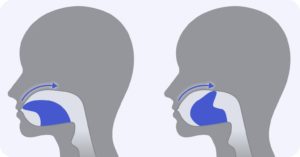
Courtesy – Sleep Foundation
Exercise 2: Tongue Push Up
Place the tip of your tongue at the roof of your mouth, right at the spot where your upper teeth meet your gums.
Now, open and close your lower jaw while holding the teeth position.
You should repeat this exercise 5 times.
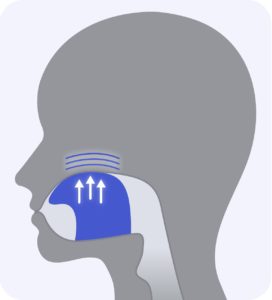
Courtesy – Sleep Foundation
Exercise 3: Tongue Suction
Place the tip of your tongue at the spot where your upper teeth meet your gums and suck the entire tongue up.
Now, open and close your lower jaw while holding the teeth position.
You should repeat this for 10 minutes everyday.
Exercise 4: Tongue Aerobics
Start by sticking your tongue out.
Next, try to reach your nose with your tongue.
Hold the position for 10 seconds.
Now, try to reach your chin with your tongue.
Hold the position for 10 seconds.
Now, stretch your tongue to the left.
Hold the position for 10 seconds.
Repeat the same on the right side.
You should repeat these 4 stretches for 10 minutes.
Tongue Exercise 5: Tongue stretch
Start by sticking your tongue out straight as far as you can reach
Hold your tongue in this position for 10 seconds.
Repeat this exercise five times.
Increase the duration of this exercise gradually.
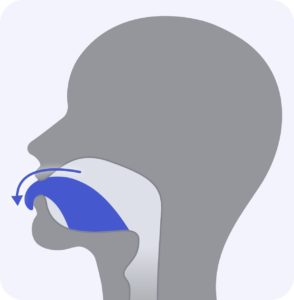
Courtesy – Sleep Foundation
2. Jaw Exercises:
Jaw exercises can reduce snoring by strengthening muscles in the jaw and preventing the tongue from collapsing and obstructing the airway during sleep.
Exercise 1:
Open your mouth, and move your jaw to the right side.
Hold this position for 30 seconds.
Now, repeat the same on the left side.
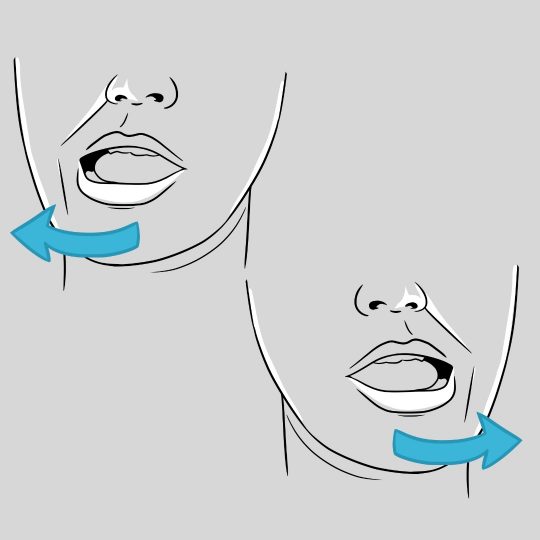
Courtesy – South Florida
Exercise 2:
Close your mouth tightly and purse your lips.
Now, open your mouth, and relax your jaw and lips.
Repeat this exercise 10 times daily.
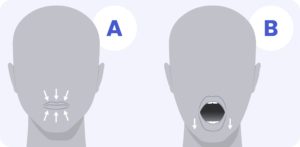
Courtesy – Sleep Foundation
We have also covered jaw exercises for temporary pain relief from TMJ. If you or anyone you know has been experiencing TMJ pain, you should read our guide: Simple Jaw exercise for temporary pain relief
3. Throat Exercises:
Throat exercises for sleep apnea and snoring can tone and strengthen the muscles in the throat. These exercises for snoring reduce the chances of the airway collapsing and thereby reduces snoring.
Exercise 1: Pronounce Vowel Sounds
Practice enunciating the vowels a-e-i-o-u.
Begin by saying each vowel normally.
Gradually, you can draw out the vowels, ensuring each of them lasts a little longer.
Repeat each vowel 10 times in a row before switching to the next one.
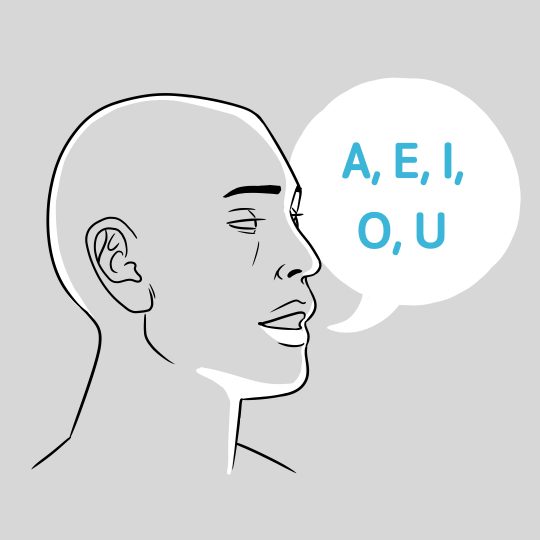
Courtesy – South Florida
Exercise 2: Singing
Taking singing lessons can help alleviate snoring.
You can also sing your favourite song out loud daily.
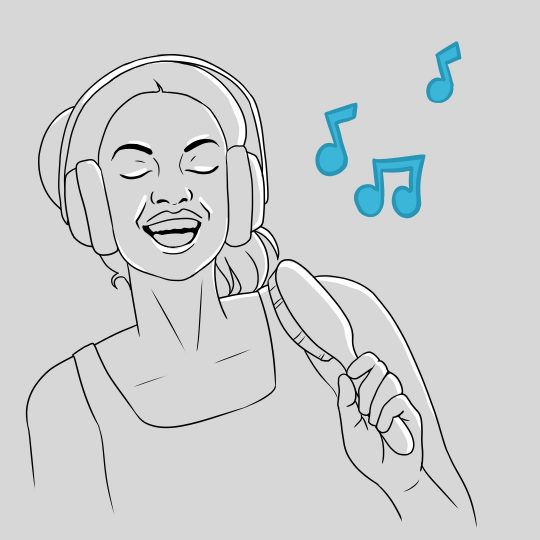
Courtesy – South Florida
4. Breathing Exercises:
Breathing exercises can reduce snoring by improving the control of airflow and promoting nasal breathing, reducing the likelihood of mouth breathing and airway obstruction during sleep.
Exercise 1: Breathing Through Your Nose:
Close your mouth and relax your jaw.
Start by using your index finger to close the right nostril.
Now, breathe in through your left nostril.
Use your index finger to close your left nostril and then breathe out through your right nostril.
Repeat the exercise 5 times for each nostril.
Exercise 2: Balloon Breathing
Take a deflated balloon and place the open end in your mouth.
Now, breathe in through your nose.
Breathe out into the balloon with enough force to inflate it.
You can repeat this exercise at least 5 times before you remove the balloon from your mouth.
If you’re looking for personalised mouth breathing exercises recommendations, you can consult with a myofunctional therapist who can provide tailored exercises based on your individual needs.
To summarise, snoring exercises offer a non-invasive method to stop snoring. There are other methods that can be used to determine the underlying cause for snoring.
For example, in order to determine if snoring is causing sleep apnea, you can participate in a sleep study. This non-invasive sleep test can accurately determine the type of sleep disorder you have. When diagnosed correctly, a specialist can create a treatment plan tailored to your diagnosis. Learn more about sleep studies with our informative guide on sleep disorders.
Holistic Treatments For Snoring:
1. Airway Orthodontics:
Airway orthodontics is a holistic approach that can help correct jaw position and frees up the airway recognizing its impact on breathing and sleep. Misaligned teeth or an improper jaw position can cause blockages, disrupting breathing. Jaw correction expands the airway, reducing breathing issues and improving sleep quality. By correcting such structural issues, airway orthodontics helps alleviate sleep disorders like snoring and sleep apnea.
Airway orthodontics uses a variety of appliances, such as braces, aligners, alternate lightwire appliances, maxillary skeletal expanders, and day/night appliances, to correct the position of the jaw and expand the airway. These appliances are designed to improve breathing and treat sleep disorders like snoring and sleep apnea.
2. Oral Myofunctional Therapy:
Oral myofunctional therapy helps treat snoring, strengthening the orofacial and tongue muscles with the aim to establish the jaw joint. This relieves the tensed muscles, thereby relieving the pressure on the airways, opening them up, and ensuring a person can breathe normally as they get a good night’s sleep without snoring.
3. Breath Retraining:
Breathe retraining is an approach where the goal is to achieve physiologically normal nasal breathing 95% of the day and night. It involves exercises to slow and deepen breathing, reduce tension in the throat and chest, and promote more efficient airflow during sleep.
4. Use of Sleep Appliances:
Sleep appliances such as Silensor, Dorsal Sleep Appliance, GNM Orthotics and ProSomnus LP Continuous Advancement Sleep Device are types of mandibular advancement devices (MADs). These devices are worn by the person with the snoring condition. MADs are used for proper positioning of jaw and tongue, this can open up the airway and reduce snoring.
There are also Tongue retaining devices such as EVO Sleep and Snore Device, which holds the tongue in the forward position as the person sleeps. This ensures that the tongue will not fall back and obstruct the airway. This makes sleep appliances an effective treatment for snoring and sleep apnea.
5. Continuous Positive Airway Pressure (CPAP) Therapy:
Continuous positive airway pressure (CPAP) therapy is another treatment for sleep apnea, which can alleviate snoring. For this treatment, you have to wear a mask that will cover your nose or mouth when sleeping. This mask will be connected to the CPAP machine, which will deliver a constant stream of air pressure through it. The air pressure helps to keep the airway open and prevents snoring.
A specialist might suggest breath training exercises in conjunction with CPAP therapy, as they can work in tandem to improve breathing patterns and reduce the need for high air pressure levels.
D] Conclusion
We have covered effective snoring exercise and a wide range of treatment options that can help alleviate snoring. So, If you or someone you know is struggling with snoring, then you should consider these snoring exercises. You can also get in touch with an expert, who can diagnose you, offer tailored exercises, and suggest the right treatment option.
We encourage you to contact TMJ, Tongue Tie & Sleep Institute for expert diagnosis and sleep apnea treatment in mumbai. Our specialists can help improve your sleep quality and overall health, so schedule your appointment today!
